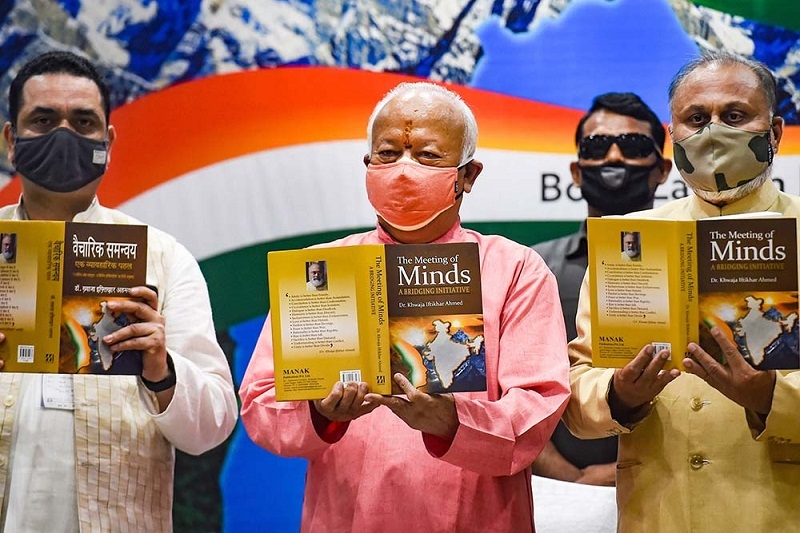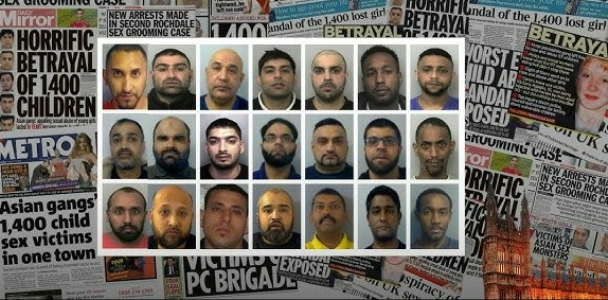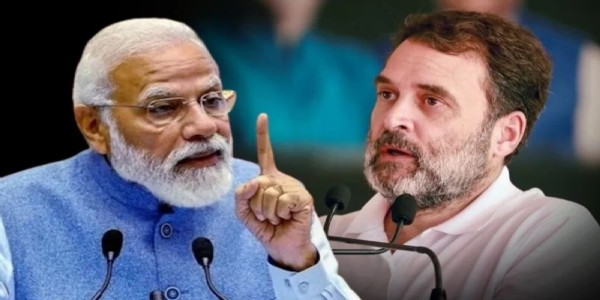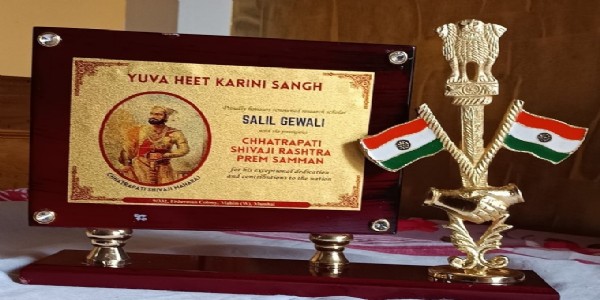The Meeting of Minds: A Bridging Initiative: A noble attempt to bridge the Hindu-Muslim divide

RSS Sarsanghchalak Dr. Mohanrao Bhagawat released the book 'The Meeting of Minds: A Bridging Initiative' at a function at Ghaziabad in UP on July 4, 2021. (A newsbharati file photo)
The Meeting of Minds: A Bridging Initiative by Dr. Khwaja Iftikhar Ahmed undertakes the study of the political and socio-cultural aspects of Indian Society. The book certainly inclines the readers to think about the alluvium of prejudices and misunderstandings that have accumulated in the country over a long period of time, and in turn, led to the creation of a divide between the Hindu and the Muslim communities. Sadly, this divide is increasingly becoming more and more solidified instead of breaking down. Ahmed’s book engages in a two-fold task: it explains the numerous causes of these prejudices, and, at the same time, sheds light on the contemporary political scenario. From the very outset, the readers are curious to find out the manner in which the book confronts the so-called divide between the Hindus and the Muslims. They may be faced with several questions like what could possibly be the outcomes of a literary discourse; is it possible to eradicate the prejudices that people have assimilated in their lives largely owing to vote-bank politics, and, ultimately, what is the motive behind the publication of a book on such a contentious subject?
Ahmed has attempted to answer most of these questions in his book because it appears that things that remain unsaid breed misrepresentations, especially for those who wish to avoid the murky waters or for those for whom debates and discussions are not necessarily the roads to reconciliation. Ahmed writes that his book is “an honest attempt to build a bridge between the Muslim community and the Sangh Parivar, something that firmly stands on mutual credibility, honesty, and integrity. India is ready for this shift and change” (5). However, many a time in the course of his writing, Ahmed admits that some people might think that he is “going against [his] community,” when actually, his research is a noble attempt to bring the two communities together so that India ushers into a great nation on the world map. In the forward to the book, Dr. Karan Singh has rightly pointed out: “While we may not agree with all his analyses and conclusions we must appreciate his bold and positive approach to the crucial question of Hindu-Muslim harmony which is so important for the welfare of our nation” (xix).
The book has been written in continuation of Ahmed’s previous book Sangh Parivar and the Indian Muslim—a Muslim Perspective (2012). The book opens with the trajectory of the development of RSS as an organization that has gained legitimacy because of its inimitable commitment and dedication. In this book, Ahmed does not hesitate in highlighting the reservations that the Muslim community holds towards Hindus and vice-versa. He also elucidates some commonly mistaken or misunderstood concepts of Islam that sometimes gains more attention than they merit. According to him, it is high time Muslims stop considering RSS as their enemy. In order to dispel the conservative ideas that they hold against RSS, it is important to understand the ethos, ideas, and ideals of the organization. Through wide-ranging discussions, substantiated by facts and examples, Ahmed has tried to refute the argument that RSS is an exclusive religious center. In fact, contrary to this popular opinion, RSS is highly inclusive in nature. For instance, the idea of Hindutva is not related to Hinduism, but it is a form of cultural nationalism that acts as a driving force to unite the people of this country across religions. A major part of this problem, he believes, is the impact that the idea of secularism has on the mass psyche. Ahmed contends that the western idea of secularism is dangerous for a country that has always believed in the idea of Sarv Dharma Samabhav (equal respect for all faiths).
The book also lays emphasis on the role of the BJP in the current political scenario. The party in the opposition claims to follow Gandhian ideals, from which, Ahmed claims, they have deviated long back. In this book, Ahmed addresses the Muslim community without mincing words and urges them to set aside all their misunderstandings related to RSS and BJP, as organizations only of and for Hindus. It would be unwise to develop such a prejudiced perception when the efforts made by RSS and BJP to bring the Muslim community together tell a completely different story. In continuation, and quite interestingly, Ahmed also highlights the misconception that Hindus hold for Muslims. In his view, it is high time that we think about these differences and eradicates them through debates, discussions, and mutual understanding.
In the consecutive chapters, he talks about the rise of the Sangh Parivar and the decline of the congress party. He believes that the secular polity and deviation of the Congress party from the Gandhian path led to the rise of the Sangh Parivar. Additionally, the Congress party’s appeasement politics and the consequent Ram Mandir movement stirred the sentiments of the Hindus. After the coalition of the BJP and the Janata Party, the RSS-BJP duo started gaining popularity among the common masses. The think tanks of the RSS and the BJP work at the grassroots, unlike the closed coterie of the opposition party. Ahmed also focuses on the fact that the Muslim community lacks think tanks because of which there is a dearth of dialogue between them and the RSS-BJP.
In order to understand the ethos and the working of the present government, Ahmed focuses on the idea of India that they propound. Reaching out at the grassroots and a massive network of supportive institutions have helped BJP effect social change as well as gain acceptance among the masses. The innumerable supporters and sympathizers of RSS-BJP in sectors like the judiciary, media, education, and the service sector, to name a few, demonstrates the growing popularity and influence of the party.
In the chapter titled “Where Did We Go Wrong,” Ahmed highlights the traditional mindset of the Muslim community and their blind belief in a misplaced idea of secularism. He points out, “Politics in a democracy is not about blind support or one-sided relationships. All opinions and players have to be put on trial and to the test. Politics is a game of art” (112). This reluctance to hold dialogues and discussions by the Muslim community, according to Ahmed, lay at the roots of controversies related to the Ram Mandir, the Common Civil Code, the CAA, the NRC, the NPR, and other such decisions in which both the communities were involved. Other major events that led to the rise of the BJP were the Rath Yatra and the Ayodhya Dispute. Ahmed gives an objective analysis of the various strategies adopted by the BJP and the cause of their subsequent failure and success. He believes that the rise of Narendra Modi as the ‘national icon’ of integrity and development at a time when people were not enthusiastic about the Congress party furnished him the opportunity to prove his worth. In addition to this, the handling of the Kashmir issue, the Ayodhya Mandir verdict, and the amendment in the Triple Talaq legislation are some of the major moves which reflect the political willpower of the BJP to make concrete and decisive decisions.
In the present times, the growing influence of the internet has come as a boon in many ways, as it provides an accessible platform to communicate with people and disseminate information about new policies, programs, and developments. However, it has its own set of challenges too. For instance, social media, being a fast and effective source, has repeatedly been used to manipulate misinformation and spread rumors. Ahmed advises his readers to develop and implement their beliefs, choices, and preferences wisely. In his view, the work done by the present government in the area of economic, military, and foreign policies is a testimony to the remarkable efforts put in by the BJP for the betterment of the nation.
Ahmed, in no equivocal terms, exposes the reservations of the Muslim community against the present government. He blames the Congress party for the poor conditions that the Muslim citizens of the country were subjected to. He laments the backwardness of the community, especially in North India, and blames the selective support the Congress party provided to the elite group of Muslims, ignoring the majority of the Muslim population. Ahmed also questions why there is little or no interest in the Muslim community in working hand-in-hand with the present government and playing a participatory role in the policies of the government. His book applauds BJP for its transparency and all-inclusive policies that have started benefiting the Muslim community and pulling them from the trenches of poverty.
The author appeals to the people from the Muslim community to undergo self-introspection to understand the different aspects of the present government and its working, so that rigidity does not come in the path to their emancipation. According to Ahmed, the peaceful acceptance of the Ayodhya verdict within the community can set an example and lead the path for the same. The author advocates for a twenty-first-century state that is coherent with scientific thought without a disregard for our roots. Ahmed is of the view that the BJP does not ignore his community as claimed by many. He believes that the proposal and initiative of the formation of the Muslim Rashtriya Manch (MRM) by Indresh Kumar is a perfect example of RSS being supportive of the Muslim community. It aims at reaching all sections of Muslims, thus breaking the erstwhile norm of focusing just on the elite class by the Congress.
By way of conclusion, we can say that Ahmed is looking positively at the change which India, as a nation, is undergoing. He reminds the readers to have faith in the democratic set-up of the country which is backed by a well-documented constitution and the rule of law. Our modern state is moving towards the attainment of a welfare state with an efficient legislature, executive, and judiciary. The sense of direction our government has provided, Ahmed claims, has strengthened the idea of India, as we know it. Thus, to coexist, harmony and peace could be our guiding lights. Even during the world pandemic, these values and ethics of oneness have helped us overcome myriad obstacles under the constant guidance of state authorities. A healthy society respects the law and the idea of coexistence, which we have gracefully achieved with the right planning and discipline demonstrated by the present BJP government. There will be no conflict of interest if one community interacts with the other with an open mind and believes in the narrative of progress and holistic existence.
However, the book also narrates the political journey of the author and can become repetitive at times. Sometimes, it also loses focus while making an argument. However, it is an absolutely delightful piece of reading for it is backed with facts more than opinions or judgment. At some points, Ahmed is also critical of the BJP for not being the best judge. For instance, he is critical of the RSS staying quiet on the issue of viewing Muslims as guilty of partition. He appeals to both the communities and the Sangh Parivar to look at each other with the feeling of brotherhood. All the disputes of the present times are examples of confusion and lack of understanding that they have long nurtured for each other. The author also appeals to the readers to concentrate on facts and be supportive of the party and organization which has kept their promises, has been decisive enough to take bold decisions and has stood the test of time.
Dr. Ahmed has come a long way from being the only Urdu columnist supporting the present government in the 90s to being an advocate and instigator of change in the Muslim community. Ahmed can be looked at as a man and a citizen who is motivated by the ethic of development alone. He believes that one must be accommodating towards issues like religions, beliefs, and faiths in the wider interest of betterment. He is convinced that now is the time that we as citizens must speculate about scientific progress, infrastructural developments, and educational reforms. In order to embrace these fast-paced changes, it is our duty as citizens to be open about the changes that demand to shed of differences and embracing of the ethic of solidarity and oneness. We must remember that the progress of India as a nation will ensure our own personal and individual progress too. Moving forward, we must not forget that India is a cause that is greater than any of us!
About the Book: The Meeting of Minds: A Bridging Initiative
Author: Dr. Khwaja Iftikhar Ahmed
Manak Publications, New Delhi, 2021
ISBN: 978-81-945875-8-3
Rashtriya Sewa Bharati
Mes, Pune







